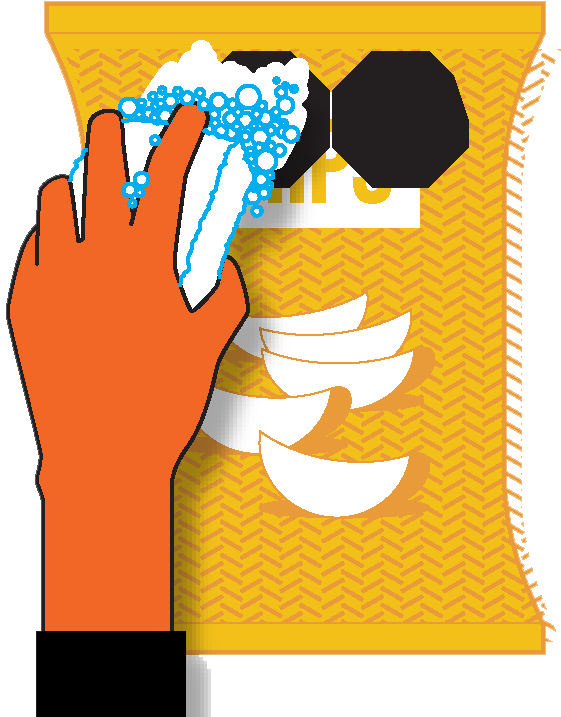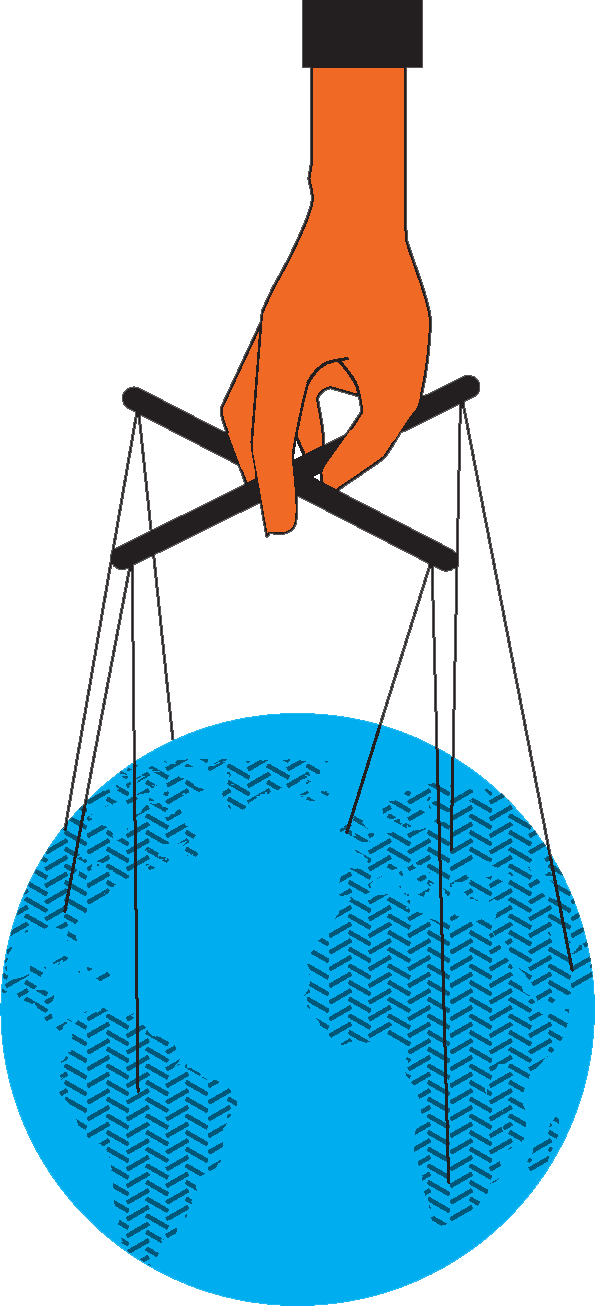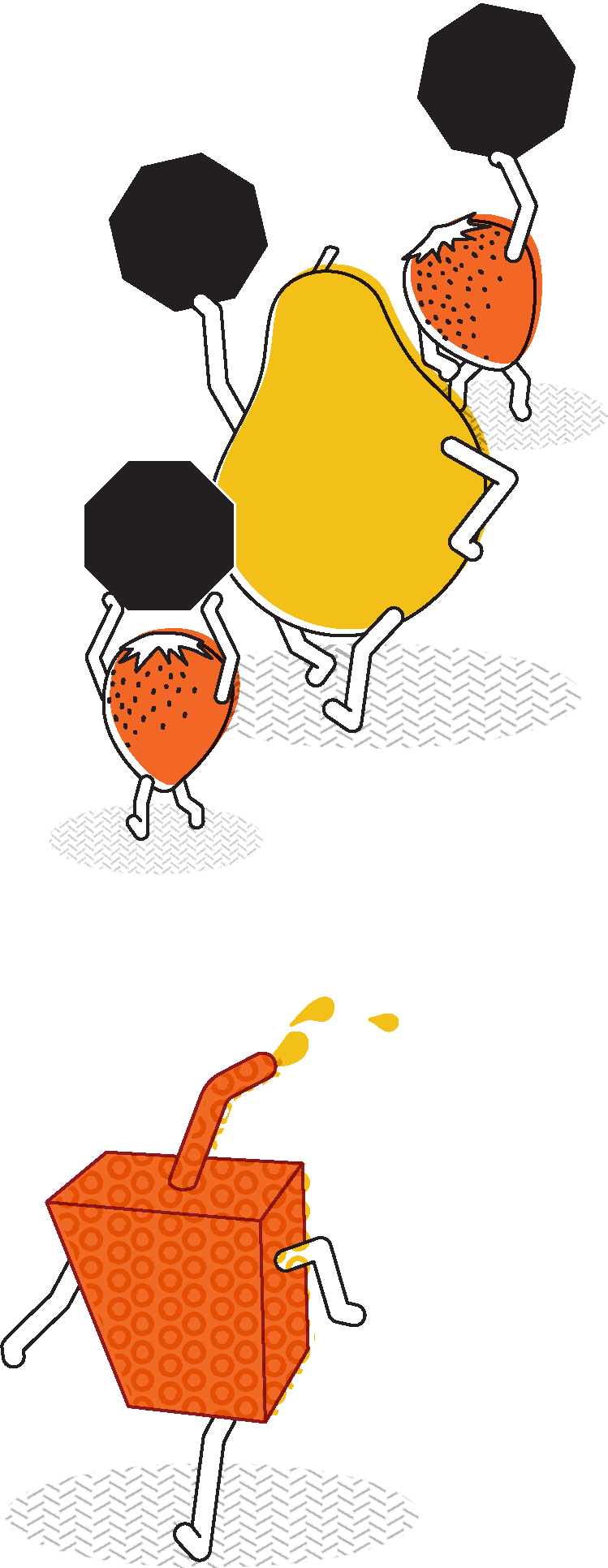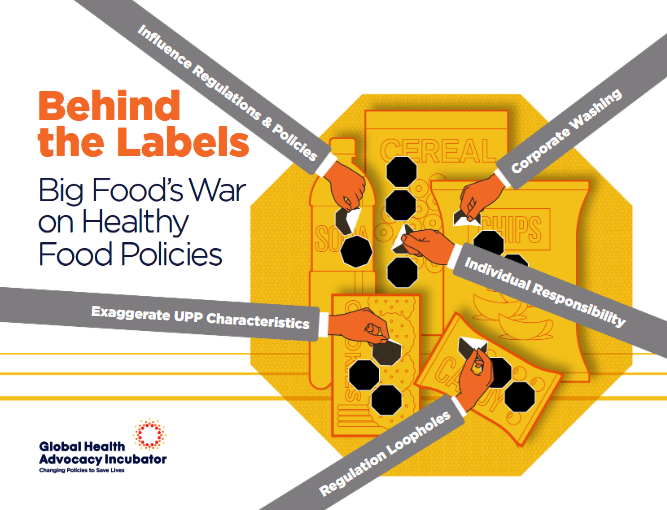Behind the Labels: Big Food’s War on Healthy Food Policies

The ultra-processed food and beverage product industry follows a corporate playbook to protect its business goals. Advocates and civil society organizations around the world are fighting back.
The Problem
Non-communicable diseases (NCDs) represent a leading cause of premature mortality and morbidity worldwide, accounting for 71% of total deaths. Unhealthy eating patterns, including consumption of ultra-processed food and beverage products (UPP), are one of the main modifiable risk factors responsible for the increase in the prevalence of NCDs.
Front-of-package labeling (FOPL) regulations represent a key public health measure to promote healthier food environments and address NCDs. Nevertheless, the UPP industry is undermining policy design and its advancement. Currently, the industry has shifted its stance from outright opposing FOPL to seeking to weaken the policy standards and requirements.
Where governments have approved FOPL, companies are attempting to delay implementation and avoid compliance through a variety of constant, systematic and sophisticated tactics. These tactics are used to interfere in policy debates to undermine and jeopardize the adoption and implementation of evidence-based, healthy food and nutrition policies that contribute to the fulfillment of the right to adequate food, free from conflicts of interest.
Although big companies often try to frighten governments and civil society with their economic power, advocates can still find innovative ways to expose the UPP industry’s unethical and deceitful practices, and to support governments as they develop and promote healthy food policies. There are actions that advocates can take to prevent and mitigate these implications.
Industry Strategies
The Global Health Advocacy Incubator has monitored ways the industry has globally interfered in FOPL regulatory processes. Five overarching UPP industry strategies were identified:
INDUSTRY STRATEGY #1:
Protect the UPP industry’s reputation and brands through corporate washing.
The industry performs multiple brand-washing activities that capitalize on social, economic, nutritional, health, gender, cultural, and environmental causes.
INDUSTRY STRATEGY #2:
Influence policies through multilateral bodies to delay implementation and threaten countries with legal and economic concerns.
By coopting multilateral bodies at global, regional, and local levels, the UPP industry guarantees normative frameworks and contexts that allows it to expand its agribusiness, and avoid and weaken regulations around healthy food policies.
INDUSTRY STRATEGY #3:
Divert attention from its corporate responsibility on the damage to environmental and human health to blame individuals for their behaviors.
Even though corporate practices have globally shaped unhealthy food environments, the industry fails to take any responsibility for the environmental and human health damages they cause, putting the burden of NCDs on individual behaviors.
INDUSTRY STRATEGY #4:
Imply that their products contribute to health, the environment, and society while blocking the development and implementation of healthy food policies.
The industry assigns unique and positive attributes to UPP to help build loyalty and guarantee consumption over time, with special attention on childhood.
INDUSTRY STRATEGY #5:
Seek loopholes in regulations to continue promoting ultra-processed products.
By taking advantage of legal loopholes or vague normative frameworks, the UPP industry finds a way to undermine the public health purpose of healthy food policies.
Examples of UPP Industry Strategies
GHAI collected hundreds of examples of corporate practices with the potential to interfere in the development and implementation of healthy food policies at the global, regional, and country levels by the UPP industry and its allies. Here are a few.
Recommendations
Based on the experience of many CSOs worldwide, when trying to prevent and counter UPP industry interference on FOPL policies, advocates should:
- Monitor industry practices and use those findings to develop collective, creative responses that effectively counter and unmask UPP industry tactics.
- Explore legal avenues to advocate for UPP industry accountability. Legal work may also be useful to anticipate intimidation and opposition actions coming from companies.
- Avoid loopholes, gaps, and ambiguities when developing FOPL policies, which should be comprehensive and based on the highest technical standards. Clarity will limit the UPP industry's opportunities to bypass or undermine FOPL regulations.
- Demand transparency and no conflicts of interest for all decision-making levels and in all evidence formulation.
What Do Advocates Around the World Say?

We will not let the junk food industry trick us; we demand clear labels now!
— Alejandra Contreras and Paulina Magaña, El Poder del Consumidor

An effective evidence-based FOPL system allows consumers to identify unhealthy foods. As a party to the UN Declaration of Human Rights, it's the government's responsibility to protect the health of Jamaicans above vested interests and financial gains of the food industry.
— Barbara McGaw, Heart Foundation of Jamaica

The mandatory nutrition labeling could help people raise their awareness on nutrition roles for health, and promote their behaviors of healthy food choices and practices of healthy diets.
— Huyen Doan, GHAI Vietnam Country Director

Passing the FOPL regulation would not breach MERCOSUR’S legal framework. Countries can advance autonomously in norms that protect the right to health.
— Luciana Castronuovo, FIC Argentina
Civil society and public health experts need to come together to strictly regulate the levels of salt, sugar, and saturated fat in processed and ultra-processed food. India is predicted to account for 50% of the world’s heart ailments by 2023. Warning labels on food for consumer awareness and right to choice will be a bold step toward preventing our country from becoming the NCD capital of the world.
— Ashim Sanyal, COO, Consumer VOICE (India)
More from advocates:
Prof. Aron Troen, Hebrew University of Jerusalem
Ignacio Drake, Health Coordinator of Consumidores Argentinos
Diego Rodriguez Sendoya, Uruguayan local advocate
Download the Report
Access the full report Behind the Labels: Big Food's War on Healthy Food Policies.
- Full Report (English)
- Executive Summary (English)
- Full Report (Spanish)
- Executive Summary (Spanish)
- Full Report (Portuguese)
- Executive Summary (Portuguese)
Watch Webinars
Listen to a conversation with advocates from around the world talking about industry interference in healthy food policies in their countries and how they have countered it.


















